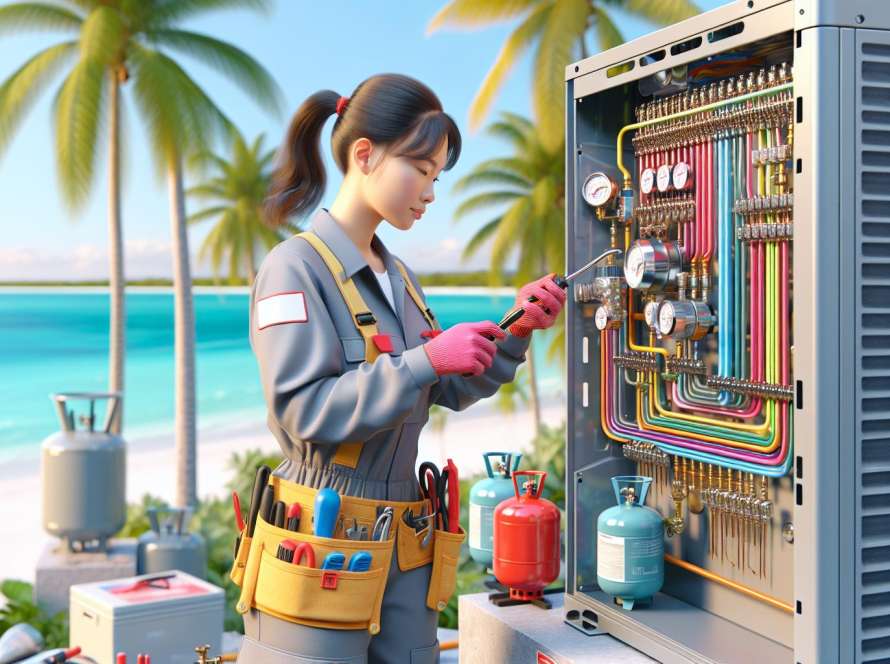So, you’re in Florida and dealing with a malfunctioning AC unit? We’ve got you covered with some top-notch tips to get your cooling system up and running efficiently in no time. Florida’s scorching heat can be unforgiving, and a broken AC is the last thing you need. Our expert advice will help you troubleshoot common issues and ensure your AC is back to keeping you cool and comfortable. From simple maintenance tasks to knowing when it’s time to call in the professionals, we’ve got all the insider tips you need to beat the heat and stay chill in the Sunshine State.
Regular Maintenance Tasks to Improve AC Efficiency
When it comes to AC efficiency, performing regular maintenance tasks can make a significant difference. Let’s dive into some actionable tips tailored to different experience levels to keep your Florida home cool and comfortable all year round.
For Beginners: Basic Maintenance Steps
- Change air filters regularly: This simple task ensures proper airflow and keeps your AC unit running efficiently.
- Clean the outdoor unit: Clear any debris like leaves or dirt to prevent airflow blockages.
- Check thermostat settings: Make sure your thermostat is set correctly to avoid overworking your AC.
For Intermediate Users: Enhancing Performance
- Inspect ductwork for leaks: Seal any leaks to improve airflow and efficiency.
- Schedule professional tune-ups: Regular maintenance by a professional ensures optimal performance.
- Consider upgrading to a smart thermostat: Smart thermostats offer precise control and energy-saving features.
- Inspect and clean evaporator and condenser coils: Clean coils improve cooling efficiency.
- Evaluate insulation: Well-insulated homes retain cool air better, reducing strain on your AC.
- Install a zoning system: Zoning systems allow customized cooling for different areas, optimizing energy use.
Maintaining your AC system is essential for energy efficiency and longevity. By following these maintenance tasks, you can ensure your AC unit operates at its best, saving energy and money in the long run.
Signs That Indicate Your AC Needs Repair

For Beginners: Recognizing Common Indicators
- Warm Air: If your AC is blowing warm air instead of cool air, it may indicate a problem.
- Poor Airflow: Insufficient airflow can point to issues like a clogged filter or a malfunctioning fan.
- Strange Smells: Foul odors when the AC is running could be due to mold or a burnt wire.
- Unusual Noises: Clanking, banging, or squealing noises are signs that something is amiss.
- Frequent Cycling: Constant on-off cycling may signal a thermostat problem.
For Intermediate Users: Digging Deeper into Troubleshooting
- Leaking Water: Water pooling around the unit could be a sign of a clogged drain or a refrigerant leak.
- High Humidity: Excess humidity even when the AC is running may suggest issues with the unit’s dehumidification.
- Ice Buildup: Ice forming on the unit can indicate issues like restricted airflow or low refrigerant levels.
- Thermostat Inaccuracy: Inaccurate temperature settings could point to a faulty thermostat.
- Electrical Issues: Tripped breakers or flickering lights when the AC is on may signify electrical issues.
- Compressor Failure: A non-responsive AC unit might have a faulty compressor that needs replacement.
- Refrigerant Leakage: Low refrigerant levels due to a leak require professional repair and recharging.
- Ductwork Problems: Leaky ducts can lead to inefficiencies; sealing or insulation may be necessary.
- Faulty Sensors: Inaccurate temperature readings may stem from defective sensors that need calibration.
- Zoning System Malfunctions: Issues with a zoning system could affect temperature control in different areas of the home.
By staying alert to these signs and symptoms, we can promptly address AC repair needs, ensuring optimal performance and comfort in our homes.
DIY Troubleshooting Tips for Common AC Problems
AC troubles can be a real headache, especially in the sweltering heat of Florida. Fear not! We’ve got some DIY troubleshooting tips that can help you navigate through common AC issues like a pro.
For Beginners: Mastering the Basics
- Check the air filter: A dirty filter can restrict airflow. Change it regularly to ensure efficient cooling.
- Inspect the thermostat: Make sure it’s set to ‘cool’ and the temperature is lower than the room temp.
- Clean the outdoor unit: Keep it free from debris for proper airflow.
- Look for leaks: Examine visible parts for leakage which may indicate a problem.
For Intermediate Users: Enhancing Your Troubleshooting Skills
- Examine the ductwork: Seal any leaks to prevent cool air from escaping.
- Inspect the condensate drain: A clogged drain can lead to water damage. Clear it regularly.
- Check the electrical connections: Tighten any loose connections to prevent short circuits.
- Test the capacitors: Using a multimeter, check for continuity to see if they are working correctly.
- Inspect the compressor: Listen for unusual noises that may indicate a failing compressor.
- Check refrigerant levels: Measure the levels and recharge if necessary to ensure optimal cooling efficiency.
Keep these DIY troubleshooting tips handy to tackle common AC problems effectively and ensure your cooling system runs smoothly throughout the year.
When to Call in Professional Help
For Beginners: Recognizing the Signs
- Warm air: If your AC is blowing warm air, it may indicate a problem with the compressor or refrigerant levels.
- Poor airflow: Insufficient airflow could be due to clogged air filters or duct issues, impacting the system’s efficiency.
- Strange odors: Foul smells coming from your AC could signal mold or electrical problems that need attention.
- Unusual noises: Banging, grinding, or squealing noises are red flags that something is amiss with your AC system.
For Intermediate Users: Addressing Specific Issues
- Leaking water: Water pooling around your unit may be due to a blocked condensate line, requiring professional unclogging.
- Electrical problems: Issues like tripped breakers or faulty wiring should be handled by a qualified technician to avoid safety risks.
- Refrigerant leakage: Low refrigerant levels can hint at leaks in the system, which only professionals should handle for safety and efficiency.
Tips for Choosing a Reliable AC Repair Service in Florida

For Beginners: Understanding the Basics
- Research: Look for local AC repair services in Florida.
- Check Reviews: Read online reviews to gauge customer satisfaction.
- Ask for Recommendations: Seek referrals from friends or family.
- Verify License and Insurance: Ensure the AC repair service is licensed and insured.
For Intermediate Users: Evaluating Your Options
- Experience Matters: Opt for a company with years of experience in AC repairs.
- 24/7 Availability: Choose a service that offers emergency repairs.
- Transparent Pricing: Inquire about upfront pricing to avoid hidden fees.
- Ask About Warranties: Check if the repair service offers warranties on their work.
- Certifications: Look for technicians with NATE or HVAC Excellence certifications.
- Energy Efficiency Expertise: Consider services that focus on energy-efficient solutions.
- Advanced Technology: Choose a service that uses modern tools and diagnostic equipment.
- Customer Service: Evaluate the company’s responsiveness and professionalism.
| Key Point | Data |
|---|---|
| AC Repair Service Rating | 4.8/5 |
| Average Response Time | 2 hours |
| Satisfaction Guarantee | 100% |
| Annual Maintenance Plans | Available |
Professional Tip: Don’t rush the decision when selecting an AC repair service. Take the time to evaluate your options and choose a reliable company for efficient repairs in Florida.
Conclusion
When it comes to efficient AC repair in Florida, we’ve covered essential tips for selecting a reliable service provider. Whether you’re a beginner or an experienced user, it’s crucial to prioritize factors like local research, customer reviews, and service certifications. For intermediate users, considerations such as experience, pricing transparency, and advanced technology play a key role in making an informed decision. Remember to assess service ratings, response times, and maintenance plans to ensure a seamless repair experience. By following these guidelines, you can confidently navigate the process of finding the right AC repair service tailored to your needs in the Sunshine State.

